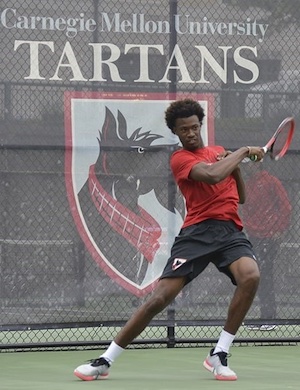By Laela Zaidi
Every year, hundreds of Phi Beta Kappa inductees are welcomed into the prestigious society for going above and beyond the expected. Especially as students enter their final year, pressure can mount to cement one’s legacy, find prestigious postgraduate opportunities, or publish papers and research. When the dust settles, however, recent graduates may wonder: What is the cost of ambition on our bodies, health, and well-being?
For recent ΦBK inductee Joshua Pinckney, this revelation became real when a diagnosis altered the trajectory of his last year at Carnegie Mellon University, disrupting a goal to end his last season of college tennis strong. One day while training on the court, Pinckney found himself unable to see the ball as well as usual. A routine eye exam led him to the emergency room, where he was unexpectedly diagnosed with multiple sclerosis. In fall 2020, he tried his best to prepare himself for the spring season—intensive medical examinations, visits with doctors, resting—but it wasn’t enough. In spring 2021, Pinckney had to step off the court.
“I broke down in tears after one match in front of my teammates,” Pinckney said. “I wasn’t able to give them what they deserved. It was a tough decision, but it was a big decision for me because, as I become a professional now, I am going to have to be honest with myself and others that have expectations of me of what I am actually able to do as a human and as a human with limits.”
Despite leaving tennis, Pinckney stayed active with his student-athlete community, but with a renewed purpose to cultivate a community of care. Being the first Black tennis player at CMU, processing a new diagnosis and disability, all while navigating the Covid-19 pandemic and national uprisings against anti-Black racism and police violence was a unique set of stressors. Pinckney saw the need for spaces where students like him could authentically express themselves and feel supported. He co-founded the Black and Latinx Student-Athlete Coalition and supported Plaidvocates, a peer-support wellness group for athletes.
Connecting the dots between public service, advancing racial justice, and communication is ambitious—Pickney is eager to take on the task. Not only does his livelihood depend on it, but it has become his “why,” guiding him to replace unnecessary resumé fillers that induce stress with meaningful experiences that foster connections and fulfill a deep calling.
“The two things looking back that I’ve been impacted by the most is investing in myself . . . if I’m a public servant, which is what my calling and my identity are if that’s who I am and what I’m going to continue to do and be, I need to invest in myself to give back. You can’t pour from an empty cup,” Pinckney noted. “Also, along with serving, you cannot leave anyone out. I always need to be making space for individuals, for groups, so that has been what my academic experience has informed me of and my personal extracurricular experiences—making space for people who don’t have a seat at the table and don’t have a voice, or whose voices are being silenced or oppressed.”
Pinckney’s liberal arts education strengthened this calling. At CMU, he embarked on research projects that bridged thinking between the humanities, sciences, and human development in the context of public health and strategic communication.
“I’m grateful that CMU is not afraid of digging deep and going wide when it comes to academic rigor. Some of the most impactful classes and work that I’ve done has been at the intersection of the sciences and humanities…I’m passionate about bridging gaps,” Pinckney said.
As Pinckney embarks on life post-undergrad, his ambitions remain big and opportunities flexible: two years of study at The Fletcher School of Law and Diplomacy at Tufts on the horizon (he has committed to entering in either fall of 2023 or 2024), hopes of doing grassroots human development work overseas, and dreams of telling stories through written and visual media. Though the path and destination are unclear, his North Star is simple: always take the time to look back, and always reflect on the “why”.
Laela Zaidi earned her Bachelor of Arts in religious studies from Hendrix College, where she was inducted into Phi Beta Kappa in May 2018. Hendrix College is home to the Beta of Arkansas chapter of Phi Beta Kappa.




